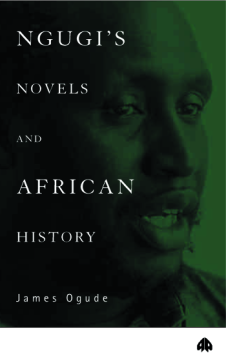
Additional Information
Book Details
Abstract
Ngugi’s entire novelistic output in examined, including his major works, The River Between, A Grain of Wheat, Petals of Blood and Matigari. Through a critique of these works, Ngugi’s radical and sometimes ambivalent attitude towards independence (Uhuru) and the manufacturing of nationhood are assessed. Ogude also looks at the wider notion of the distinct boundaries between history and fiction which postcolonial literatures have sought to question.
Table of Contents
| Section Title | Page | Action | Price |
|---|---|---|---|
| Contents | iii | ||
| Acknowledgements | vii | ||
| Introduction Writing Back and the Restoration of a Community/ Nation | 1 | ||
| Nationalism, Ethnicity and Individualism | 5 | ||
| Manufacturing Nationalism and the East African Experience | 5 | ||
| The Postcolonial Phase | 8 | ||
| Tracing Ngugi s Ideological Shift and Politics of Interpretation | 10 | ||
| 1 Ngugi's Concept of History | 15 | ||
| The Contradictions of Imagining the Nation in Earlier Works | 15 | ||
| Deviation from the Standard Nationalist Portrayal of Guerrilla War | 24 | ||
| The Later Novels | 26 | ||
| Suppression and Silences | 32 | ||
| Dependency Theory and Class Dynamics | 38 | ||
| 2 The Changing Nature of Allegory in Ngugi s Novels | 44 | ||
| Allegory in Ngugi's Earlier Texts | 46 | ||
| Allegory and Postcolonial Power Relations | 52 | ||
| Allegorical Satire and the Grotesque Image of the Body | 55 | ||
| Ngugi's Textual Counter-discourse | 66 | ||
| 3 Character Portrayal in Ngugi's Novels | 68 | ||
| The Overdetermined Narrative Structure and the Victim Type in the Later Novels | 76 | ||
| The Individualised Character: The Intellectual/ Artist Type | 81 | ||
| 4 The Use of Popular Forms and the Search for Relevance | 87 | ||
| The Use of Oral Tradition in Ngugi's Earlier Novels | 88 | ||
| Redefining Oral Tradition in the Agikuyu Novel | 92 | ||
| The Interface Between Orality and the Written | 95 | ||
| The Fantastic, Rumour and Biblical Allusions | 101 | ||
| Ngugi's Achievement | 108 | ||
| 5 Allegory, Romance and the Nation: Women as Allegorical Figures in Ngugi s Novels | 109 | ||
| Romantic Relationships as Allegorical Tropes | 109 | ||
| The Portrayal of Women in the Earlier Novels | 109 | ||
| Romance and the Portrayal of Women in the Later Novels | 112 | ||
| The Problem of Women as Victims: Wanja in Petals of Blood | 115 | ||
| Conclusion | 124 | ||
| 6 Ngugi's Portrayal of the Community, Heroes and the Oppressed | 126 | ||
| Narrating the Community and the Elite in Ngugi s Earlier Novels | 126 | ||
| The Return of Heroism and the Crisis of the African Revolution | 136 | ||
| Ngugi's Heroes: The Example of Karega in Petals of Blood | 138 | ||
| Imagining the Subaltern Under Conditions of Marginality and Displacement | 145 | ||
| Conclusion | 151 | ||
| Conclusion | 153 | ||
| History is Subversive | 153 | ||
| Notes | 161 | ||
| Introduction | 161 | ||
| Chapter 1 | 162 | ||
| Chapter 2 | 164 | ||
| Chapter 3 | 165 | ||
| Chapter 4 | 165 | ||
| Chapter 5 | 167 | ||
| Chapter 6 | 167 | ||
| Bibliography | 169 | ||
| Works by Ngugi | 169 | ||
| Articles and Books | 169 | ||
| Newspapers and Magazines | 175 | ||
| Index | 176 | ||
| Abdulla [Petals of Blood] | 29 |
